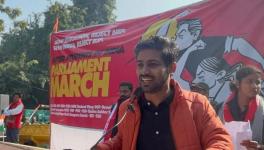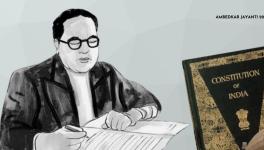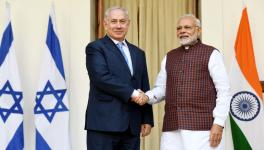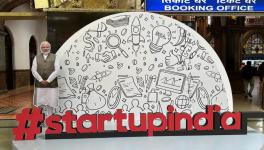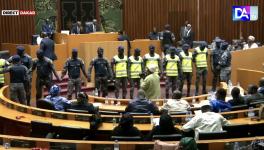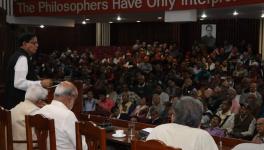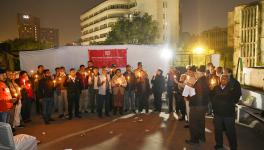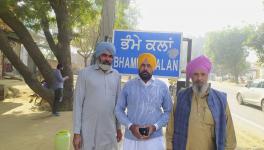Cultural Resistance Need of the Hour: Teesta Setalvad
Newsclick interviewed Teesta Setalvad on the series of awards being returned by various writers post lynching of a person in Dadri and PMs silence. Teesta explained that, this government functions on the diktat of RSS with a clear agenda of communal polarisation and hurting the multi-dimensional cultural fabric of India. She argued that PMs silence is tacit consent and explains the mood of current regime. On question of freedom of speech, Teesta explained that India being a democracy, everyone has a right to speak what the person wants and the government should respect it. Instead the government is trying to curb all the dissenting voices. Teesta argues that in such dark times, political and cultural resistance should go hand in hand and give a befitting reply to undemocratic forces.
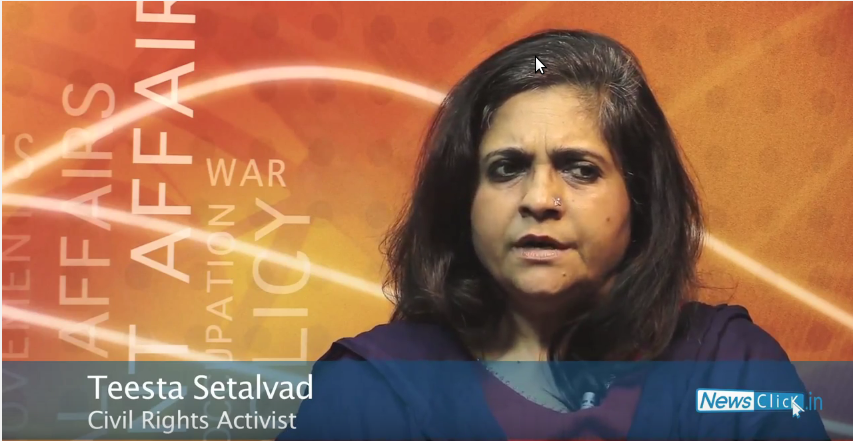
Rough Transcript:
Prabir Purkayastha - Hello and welcome to Newsclick. Today we have with us Teesta Setalvad and we will discuss the recent protest of the writers that have taken place after Kalburgi's murder or assassination and the Dadri lynching which is also being a culmination of the serious of events.
Teesta, this recent protest has really made a mark because it is been a number of people coming out, it is not just one or two isolated writers. How do you read this?
Teesta Setalvad - It is absolutely remarkable because I think it is a snowballing of absolute resentment and anchor and voice of dissent against the way a certain ideology, the ruling ideology that has captured at the center government is functioning. You know the variety of writers who are protested after Uday Prakash, the first writer, when it was relatively unnoticed, and of course the real letter set that is Nayantara Sahgal's letter and the names, right from the South, Sarah Joseph to across the country. Whats really important I feel is that, writers mean languages, languages mean culture and culture is under primary attack under this dispensation and ideology. So it is actually an open challenge which is been thrown by the writing fraternity, which is actually telling the RSS, which is ruling the country that, we are the custodians of India's culture. Diversity is the hallmark of India's culture and you can't hegemonies it.
PP - You think that this writers' protests coming at this current juncture also represents the facts that, they in some sense represent different kind of constituency if you will, that as you said the cultural practitioners and this can lead to a larger organised protest or will it lead to more; shall we say different communities coming in, artists being the other, scientists being other, who have been relatively quite?
TS - Yeah, in-fact I remember when our Prime Minister had pretty hilarious statement about the Ganesha's head. I think it was couple of months after he was sworn in. When he said that you know the existence of Ganesha as a god tells us there was plastic surgery; which is not even plastic surgery, actually it should have been transplanted. And we had no word of protest from the scientists as you said, but we did have a set of doctors I remember, who wrote a letter to the EPW and the Economic and Political Weekly carried this letter as a mark of protest of the doctors who said that, this is surely not even a plastic surgery. I think the scientific fraternity needs to speak-up but let us not forget even Krishna spoke up. TM Krishna's open letter just last week; the Carnatic singer, who sings very often with Bombay Jayshree. So I think this will actually open up a whole area which will challenge this hegemonisation. Because what we are seeing is, and as you said, the climate of complete intolerance. And not just intolerance, a climate of violence. A man been lynched to death because of what he could or should have been eaten. Three days before that, in similar area, there were three legit cattle traders been lynched to death. Two days before that in Kanpur, a young Muslim beaten to death by a crowd been called a Pakistani agent. I mean it is absolutely horrific. It is like blasphemy laws in Pakistan, that you know any sort of rumour about how you live or I live, what we eat or don't eat could set chain of reactions which actually challenge the fundamentals of this country was built.
PP - You know the political opposition to the BJP has been there. Lot of political parties have taken it up, protested and talked about it, but this is a new dimension to what shall I say opposition at the realm of thought and culture and this in that sense if it goes forward, would be a major challenge to the way the BJP is trying to remould the education system, for instance the kind of education it wants to propagate; the Batra model shall we say and the kind of science it wants to bring in; cow's urine was the other one which came in two days back; the medicinal effect of cow's urine, hair transplant, etc. So do you think all of this can come together to the level of thought it becomes another current of resistance to whats happening currently?
TS - I think it can because I think just like in banal way we say that, education is the means of social transformation. I think any political resistance cannot have a resistance without a cultural dimension. So when this regime has to be eventually toppled, has to be resisted, has to be thrown out, you need a very strong cultural voice to be able to enable that to happen. It can't happen only with words, with political speeches, with writings. I mean it can happen with political writing, it can also happen with cultural writings, with songs, with music. And I really believe that songs and music could be the next stage. I hope, I mean I must take this opportunity to congratulate the students of FTII because I think the backdrop of this is also been the resistance they have shown and to be hold out to the kind of attempt been made to narrow FTII down to a very very Yes-man institution has actually began with those students, the way they have resisted. So some way all of this comes together in a much more coherent way and let us imagine a day when may be Delhi or Mumbai or both of those and Chennai and Kolkata on the same day, you have fifty thousand or hundred thousand people culturally protesting this regime.
PP - Here it is an interesting issue, after independence movement, we really haven't seen cultural practitioners coming out in large number with the kind of united voice Mrs. Gandhi's emergency of cause was a backdrop where this could have taken place but that was also a completely stifling of the public space, that was one problem but yes, there was lot of protests of different kinds that took place under that but this is really in terms of public protest. Public protest using their name, using symbolic return of their Sahitya Akademy awards. This is really something which is quite in that sense, post independence first time we are seeing this kind of cultural expression.
TS - Possibly. I wouldn't even like to think that when we used to talk about the films and the cinemas that came out after Indian independence, you saw a certain genre of cinema which was not just the MS Sathyu's Garam Hava, in which the set also was IPTA and the producer also was IPTA and the connection with the Left but even in nation cinema, you saw a whole genre which was people oriented, people's concern oriented; you had Kisans, you have sight of farmers in the landscape of Hindi cinema because I think that the script writers and directors came out of a certain politics. So today if we actually see, not just resistance to extreme, not just majoritarian ideology but you know it is extreme right wing both politically and economically. You see the resistance actually flowering into creations of resistance. You see different kinds of cinema, film and poetry; we are possibly looking at very exciting time.
PP - So creation depends on resistance and culture has always been. Bertolt Brecht's statement 'Singing About the Dark Times'.
TS - I always remember Rehman Sahib from Pakistan who was one of the don of Human Rights movement. When we had in Kolkata under Jyoti Basu, we had the second Pak-India forum meeting and we had 163 Pakistanis for the first time been given multi-city visas because there was a Gujral government at the center, who didn't really mind there was Pakistanis roaming around, looking at cultural places and shopping all over India. That I remember, Rehman Sahib, he was asked a very nasty question by a journalist in Kolkata and he said " you have any idea what it meant for us to keep our music and our dance alive under Zia-ul-Haq? " and that is the real question; that to keep our music and our food and our poet-rial life and Narendra Modi.
PP - Thank you very much Teesta, will be in touch with you for discussing various aspects whats happening today and hopefully better days for tomorrow.
TS - Thank you so much.
DISCLAIMER: Please note that transcripts for Newsclick are typed from a recording of the program. Newsclick cannot guarantee their complete accuracy.
Get the latest reports & analysis with people's perspective on Protests, movements & deep analytical videos, discussions of the current affairs in your Telegram app. Subscribe to NewsClick's Telegram channel & get Real-Time updates on stories, as they get published on our website.









